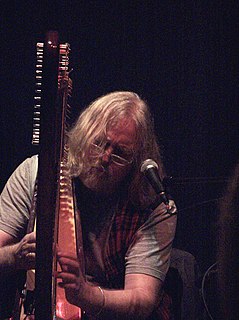Tony McManus is a guitarist from Paisley, Scotland who plays finger-style acoustic guitar arrangements of tunes from Celtic music, classical music, and other genres. McManus emigrated from Scotland to Canada in 2003.

Kentigern, known as Mungo, was a missionary in the Brittonic Kingdom of Strathclyde in the late sixth century, and the founder and patron saint of the city of Glasgow.
Fergus mac Echdach was king of Dál Riata from about 778 until 781.
Eochaid mac Domangairt was a king of Dál Riata in about 697. He was a member of the Cenél nGabráin, the son of Domangart mac Domnaill and father of Eochaid mac Echdach; Alpín mac Echdach may be a son of this younger Eochaid.
Domangart mac Domnaill was a king in Dál Riata and the son of Domnall Brecc. It is not clear whether he was over-king of Dál Riata or king of the Cenél nGabráin.

Scottish folk music is a genre of folk music that uses forms that are identified as part of the Scottish musical tradition. There is evidence that there was a flourishing culture of popular music in Scotland during the late Middle Ages, but the only song with a melody to survive from this period is the "Pleugh Song". After the Reformation, the secular popular tradition of music continued, despite attempts by the Kirk, particularly in the Lowlands, to suppress dancing and events like penny weddings. The first clear reference to the use of the Highland bagpipes mentions their use at the Battle of Pinkie Cleugh in 1547. The Highlands in the early seventeenth century saw the development of piping families including the MacCrimmons, MacArthurs, MacGregors and the Mackays of Gairloch. There is also evidence of adoption of the fiddle in the Highlands. Well-known musicians included the fiddler Pattie Birnie and the piper Habbie Simpson. This tradition continued into the nineteenth century, with major figures such as the fiddlers Niel and his son Nathaniel Gow. There is evidence of ballads from this period. Some may date back to the late Medieval era and deal with events and people that can be traced back as far as the thirteenth century. They remained an oral tradition until they were collected as folk songs in the eighteenth century.

Wellpark Brewery is a brewery in Duke Street in the East End of Glasgow, Scotland.
Celtic rock is a genre of folk rock, as well as a form of Celtic fusion which incorporates Celtic music, instrumentation and themes into a rock music context. It has been extremely prolific since the early 1970s and can be seen as a key foundation of the development of highly successful mainstream Celtic bands and popular musical performers, as well as creating important derivatives through further fusions. It has played a major role in the maintenance and definition of regional and national identities and in fostering a pan-Celtic culture. It has also helped to communicate those cultures to external audiences.
Ossian are a Scottish traditional music group, formed in 1976.

The Celtic Connections festival started in 1994 in Glasgow, Scotland, and has since been held every January. Featuring over 300 concerts, ceilidhs, talks, free events, late night sessions and workshops, the festival focuses on the roots of traditional Scottish music and also features international folk, roots and world music artists. The festival is produced and promoted by Glasgow Life. Donald Shaw, a founding member of Capercaillie, was appointed Celtic Connections Artistic Director in 2006.

The origins of the Kingdom of Alba pertain to the origins of the Kingdom of Alba, or the Gaelic Kingdom of Scotland, either as a mythological event or a historical process, during the Early Middle Ages.

Culture of Scotland in the High Middle Ages refers to the forms of cultural expression that come from Scotland in the High Medieval period which, for the purposes of this article, refers to the period between the death of Domnall II in 900, and the death of Alexander III in 1286. The unity of the period is suggested by the immense breaks which occur in Scottish history because of the Wars of Scottish Independence, the Stewart accession and transformations which occur in Scottish society in the fourteenth century and afterwards. The period differentiates itself because of the predominance of Gaelic culture, and, later in the medieval, Scoto-Norman French culture.

Robin Duncan Harry Williamson is a Scottish multi-instrumentalist, singer, songwriter, and storyteller who was a founding member of The Incredible String Band.
Domnall mac Caustantín is thought to have been king of Dál Riata in the early ninth century.
John Feeley an Irish classical guitarist, and a teacher and editor of guitar music.

Manus Lunny is an Irish producer and multi-instrumentalist from County Donegal, Ireland, best known as a member of Celtic supergroup Capercaillie. He is the brother of multi-instrumentalist and producer Dónal Lunny.
Garb mac Stairn is a character in late prose narratives and poetry (duan) of the Ulster cycle; and claims Scandinavian origins, or is represented as a giant from the Eastlands.
Ewan Campbell is a Scottish archaeologist and author, who serves as the senior lecturer of archaeology at the University of Glasgow. An author of a number of books, he is perhaps best known as the originator of the historical revisionist thesis that the Dál Riata did not originate from Ireland. He has also authored works about Dunadd and Forteviot.

Iona was a Scottish independent record label from 1978 to 1990.







